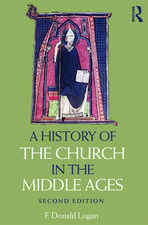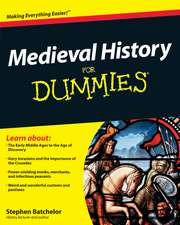From Roman Provinces to Medieval Kingdoms: Rewriting Histories
Editat de Thomas F. X. Nobleen Limba Engleză Paperback – mar 2006
Presenting the most current work including newly-available material such as translations of French and German essays, From Roman Provinces to Medieval Kingdoms gathers the key thinkers in the field together in one easy-to-use volume.
Examining a wealth of material on the origins of the Barbarian people and their tribes, Thomas F.X. Noble studies the characteristics of the tribes and debates whether they were blood-tied clans or units bound by social, political and economic objectives.
Highly readable and student friendly, From Roman Provinces to Medieval Kingdoms includes a general introduction, clear prologues to each section and makes the key debates of the subject accessible to students.
| Toate formatele și edițiile | Preț | Express |
|---|---|---|
| Paperback (1) | 378.22 lei 6-8 săpt. | |
| Taylor & Francis – mar 2006 | 378.22 lei 6-8 săpt. | |
| Hardback (1) | 1017.91 lei 6-8 săpt. | |
| Taylor & Francis – 13 mar 2006 | 1017.91 lei 6-8 săpt. |
Din seria Rewriting Histories
-
 Preț: 372.58 lei
Preț: 372.58 lei -
 Preț: 385.54 lei
Preț: 385.54 lei -
 Preț: 500.84 lei
Preț: 500.84 lei -
 Preț: 450.40 lei
Preț: 450.40 lei -
 Preț: 380.74 lei
Preț: 380.74 lei - 26%
 Preț: 356.43 lei
Preț: 356.43 lei -
 Preț: 467.78 lei
Preț: 467.78 lei - 20%
 Preț: 264.59 lei
Preț: 264.59 lei -
 Preț: 387.49 lei
Preț: 387.49 lei -
 Preț: 255.42 lei
Preț: 255.42 lei -
 Preț: 356.44 lei
Preț: 356.44 lei -
 Preț: 454.22 lei
Preț: 454.22 lei -
 Preț: 430.09 lei
Preț: 430.09 lei -
 Preț: 398.31 lei
Preț: 398.31 lei - 18%
 Preț: 1000.27 lei
Preț: 1000.27 lei - 18%
 Preț: 1225.53 lei
Preț: 1225.53 lei -
 Preț: 365.32 lei
Preț: 365.32 lei - 20%
 Preț: 260.16 lei
Preț: 260.16 lei - 16%
 Preț: 239.51 lei
Preț: 239.51 lei -
 Preț: 395.43 lei
Preț: 395.43 lei -
 Preț: 392.93 lei
Preț: 392.93 lei -
 Preț: 440.95 lei
Preț: 440.95 lei -
 Preț: 398.86 lei
Preț: 398.86 lei -
 Preț: 367.66 lei
Preț: 367.66 lei -
 Preț: 243.04 lei
Preț: 243.04 lei - 18%
 Preț: 1114.70 lei
Preț: 1114.70 lei - 25%
 Preț: 738.81 lei
Preț: 738.81 lei - 16%
 Preț: 263.36 lei
Preț: 263.36 lei
Preț: 378.22 lei
Nou
Puncte Express: 567
Preț estimativ în valută:
72.37€ • 75.56$ • 59.90£
72.37€ • 75.56$ • 59.90£
Carte tipărită la comandă
Livrare economică 04-18 aprilie
Preluare comenzi: 021 569.72.76
Specificații
ISBN-13: 9780415327428
ISBN-10: 0415327423
Pagini: 430
Ilustrații: 4 line drawings
Dimensiuni: 156 x 234 x 24 mm
Greutate: 0.65 kg
Ediția:1
Editura: Taylor & Francis
Colecția Routledge
Seria Rewriting Histories
Locul publicării:Oxford, United Kingdom
ISBN-10: 0415327423
Pagini: 430
Ilustrații: 4 line drawings
Dimensiuni: 156 x 234 x 24 mm
Greutate: 0.65 kg
Ediția:1
Editura: Taylor & Francis
Colecția Routledge
Seria Rewriting Histories
Locul publicării:Oxford, United Kingdom
Public țintă
UndergraduateCuprins
Introduction: Romans, Barbarians and the Transformation of the Roman Empire Part 1: Barbarian Ethnicity and Identity 1. The Crisis of European Identity 2. Gothic History as Historical Ethnography 3. Origo et Religio: Ethnic Traditions and Literature in Early Medieval Texts 4. Does the Distant Past Impinge on the Invasion Age Germans? 5. Defining the Franks: Frankish Origins in Early Medieval Historiography 6. Telling the Difference: Signs of Ethnic Identity 7. Gender and Ethnicity in the Early Middle Ages 8. Archaeologists and Migrations Part 2: Accommodating the Barbarians 9. Movers and Shakers: The Barbarians and the Fall of Rome 10. The Barbarians in Late Antiquity and How They Were Accommodated in the West 11. Foedera and Foederati in the Fourth Century 12. Cities, Taxes and the Accommodation of the Barbarians Part 3: Barbarian and Roman in the Merovingian Kingdom in Gaul 13. Grave Goods and the Ritual Expression of Identity 14. The Two Faces of Childeric: History, Archaeology, Historiography 15. Frankish Victory Celebrations 16. Administrations, Law and Culture in Merovingian Gaul 17. Pax et Disciplina: Roman Public Law and the Merovingian State
Notă biografică
Thomas F. X. Noble is Director of the Medieval Institute at the University of Notre Dame in Indiana. He is co-author of Western Civilization: The Continuing Experiment (2004) and author of The Republic of St. Peter: The Birth of the Papal State, 680-825 (1998).
Recenzii
'Noble's editorial interventions provide welcome assistance... Moreover, each essay, and each section of the book, is introduced succinctly by Noble, often with a set of questions that are designed to prompt critical reading... I have no doubt that the book will prove immensely useful... an excellent resource... [This book has] great value and broad appeal: anyone with a serious interest in how modern scholars engage with their past will learn much from Noble's superlative collection.' - Classics Ireland
'an excellent introductioon... this collection is to be commended.' - Journal of Medieval Archaeology
'an excellent introductioon... this collection is to be commended.' - Journal of Medieval Archaeology
Descriere
This is a prestigious collection of revisionist thinking on the key question of 'how did the middle ages begin?'. Including a wealth of material on the origins of the Barbarian people and their tribes, and a clear introduction to each section, this is an invaluable student reference.














